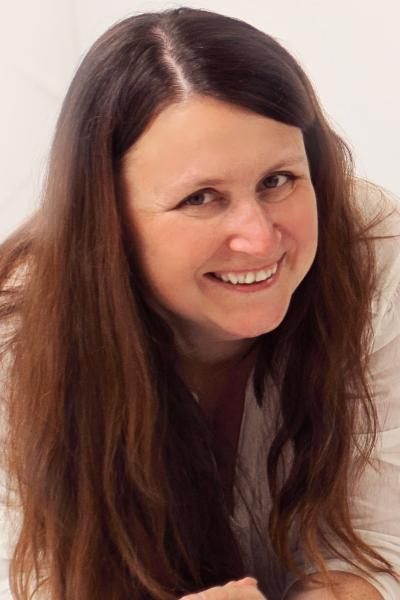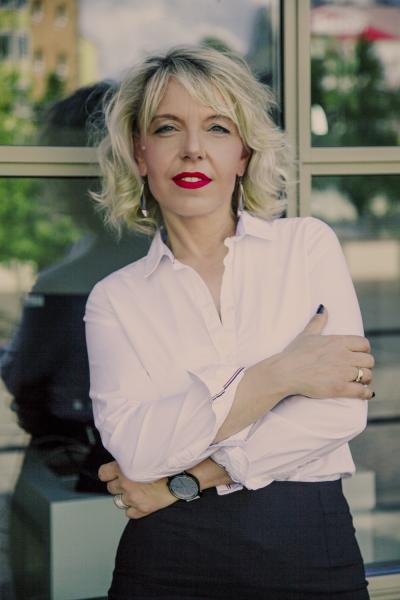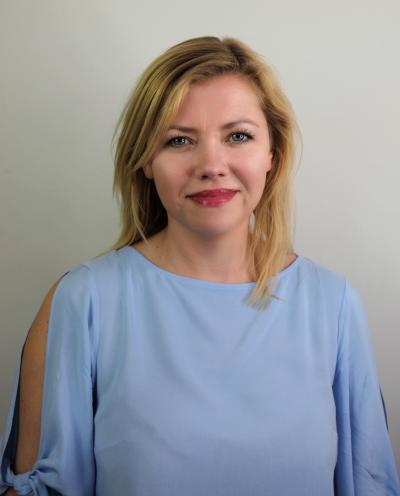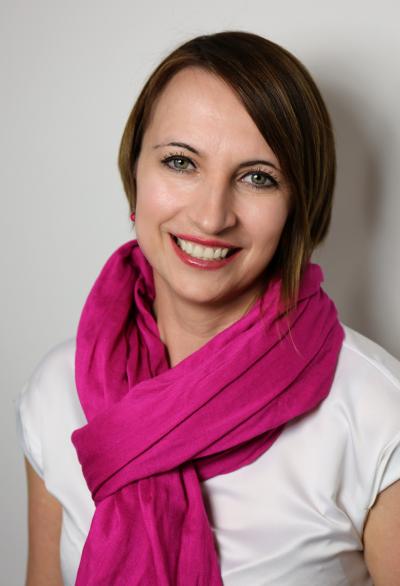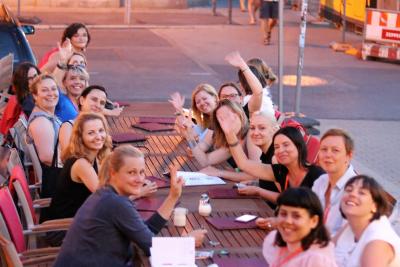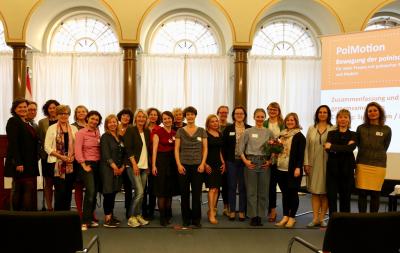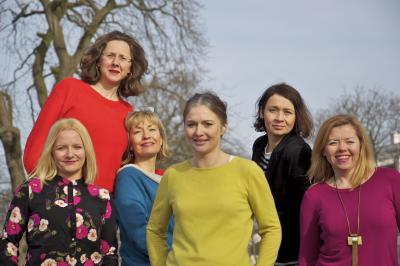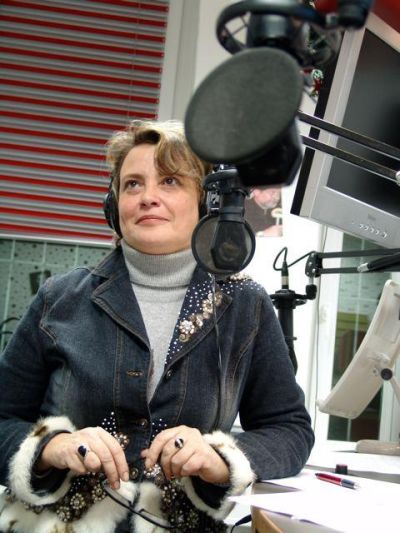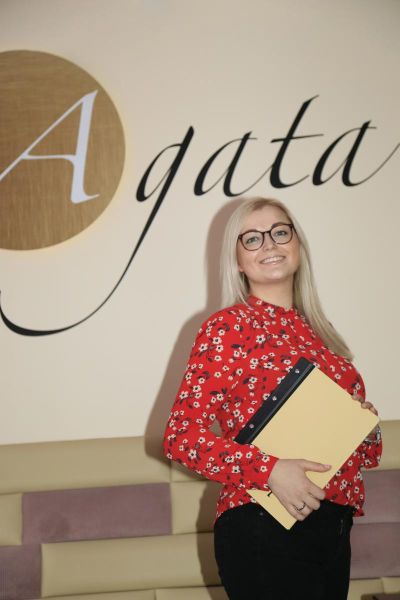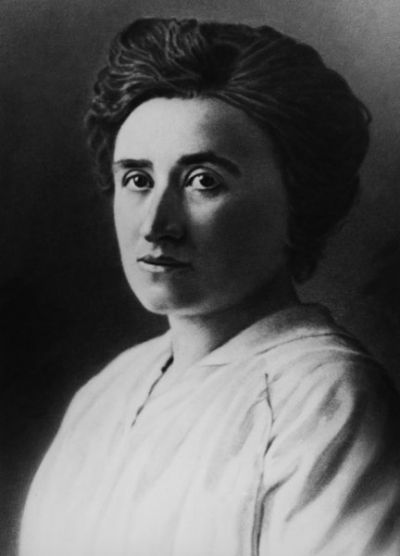The Power of the Net. Or the Network of Polish Women in Germany
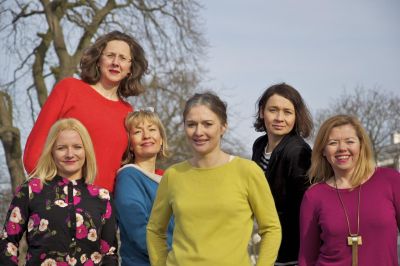
I asked these questions to representatives of friendly Polish women's organisations in Germany. When I came to this country over four years ago I wasn't aware of the importance of a social network and the resulting social capital. During my studies in Kraków and subsequently in my work I was able to maintain such a network effortlessly over a lengthy period of time. The networking didn't give me any headaches, because I either knew their organisers and participants, or I knew a person who knew these people. This was because the theory of "the six degrees of separation", according to which, roughly speaking, any person in the world can connect with any other person through a chain of indirect relationships, shrinks to two mediators in Kraków!
But suddenly I turned my orderly world upside down and ended up in Hamburg, where I knew no one but my husband. So what do you start with when you want to get to know people with whom you share your journey? Of course with an online search for relevant activities, by participating in various workshops and initiatives or by joining Facebook groups. But you can also try to do something for yourself and for others, something that my Hamburg companions finally provided for me. We regard this as a support for women who are interested in professional and personal development, cooperation and mutual encouragement, and who want to be present in German society without denying their Polish identity. For this purpose I run the Facebook group "Powerful Woman Community" with Ela Poszumska, who coaches women. In addition, we are now active together with other Polish women in Hamburg in the informal initiative "MyHH", in which we network, organise meetings and hold workshops.
In my few years in Germany I have met many unusual Polish women who live here and have founded or participate in NGOs, who are involved in informal initiatives and who cooperate, support and motivate each other, both in the virtual and in the real world.
The main motive behind our striving for cooperation is the desire to meet people who, in the words of Dr. Adrianna Tomczak, moderator of the Facebook group "Polki sobie radzą. Społeczność przedsiębiorczych emigrantek" ["Polish women perform extremely well. The community of committed migrant women"]: "See the world as we see it and share common values with us. But they also have comparable experiences from which we can learn. In addition they can be a source of support for us when we come up against our first disappointments and failures."
It is important for social activists to help others and to share their own experiences of emigration. Marzena Nowak, founder and chairwoman of the "Polki w Berlinie" ["Polish Women in Berlin"] association, sums it up as follows: "The idea of an association for Polish women in Berlin came to my mind years ago. At meetings with migrant women I came across similar problems, questions and efforts. I can well remember my own beginnings in Germany and therefore know how difficult it is to find myself in another country and in another culture. The first euphoria vanishes quickly; what remains are ambition, dreams, longings and, as time goes by, doubts, restlessness and uncertainty creep in. That's how "Polki w Berlinie!" was born.
The founders of agitPolska e. V., an association also active in Berlin, had other reasons for action. Its original goal was to spread Polish culture in Germany and German culture in Poland. Since then, however, new target groups have been developed and the profile of the association has been expanded to include projects that promote social participation, labour market issues and the interests of women and young people, stimulate discussion and promote connections. Anna Czechowska, member of the board of the association and member of the board of trustees of Porta Polonica, says: "My need for cooperation is based on my conviction that we can only implement our ideas and our proposed solutions if we work together on certain topics (also across areas and parties). It's like a team game where each individual is important for the final result and success."
Many of us who have left Poland miss the use of our mother tongue, especially at the start when we are not fluent in German or after some time when the children are born and we want them to stay in contact with their Polish families and culture. This is exactly what Justyna Rygielska from the Hamburg department of POLin. Polnische Frauen in Wirtschaft und Kultur e. V. [POLin. The Association of Polish Women in Economics and Culture e. V.] brings to the table when she says: "(...) I have met many wonderful Polish women here. There are enough women with whom and for whom it is worthwhile to start initiatives in Polish. Why? Because I need the association in order to develop my children's awareness of being Polish."
In many of the stories of Polish mothers that I heard, the promotion of their children's Polish language skills emerged as an important element in their identity. Some of them came to Germany as children themselves. These include Dr. Katarzyna Mol-Wolf, publisher and editor-in-chief of the magazine "EMOTION", who was a guest at the women's brunch in Hamburg at the end of March. After the project "PolMotion – Bewegung der polnischen Frauen" ["PolMotion – Movement of Polish Women"] of the association agitPolska e. V. had been completed, we organised the brunch together with other women at the headquarters and with the support of the ZEIT Foundation, Ebelin and Gerd Bucerius. Dr. Mol-Wolf still speaks Polish and feels, as she says herself, more Polish than German because of the language she learnt in her childhood. However, she admitted that it was not easy for her to get her daughter to develop her Polish language skills.
Fortunately, more and more initiatives and institutions are emerging in many cities, which in their various events and activities allow encounters with the language as it is lived and not only with the language learned in school. In Berlin, this is the aforementioned association "Polki w Berlinie", whose activities are also aimed at women who want to maintain contact with the Polish language and promote their children's knowledge of the Polish language. The Berlin association SprachCafé Polnisch e. V. [Polish Language Cafe e. V.] also stands out for its lively offerings in this field, organising meetings, events and courses for parents and children initiated by Polish-speaking mothers.
The WIR zur Förderung der deutsch-polnischen Zweisprachigkeit Hamburg e. V. [WIR Association for the Promotion of German-Polish Bilingualism Hamburg e. V.], which has recently started its activities in Hamburg, organises literary events on weekends devoted to both classics and newly published children's books. The aim of the association is to further children in their German-Polish bilingualism so that they feel at home in both languages and cultures, while parents can exchange their experiences with bilingualism.
These initiatives not only offer space for encounters with language and culture, but they also give children the opportunity to meet their peers and discover that other children and adults speak the language of their mums and dads, whom they usually only know from home – and that even in public!
The above-mentioned WIR association attaches particular importance to the status of the Polish language as a language of origin, but other organisations and individuals are also involved here, which join together in informal initiatives whose common denominator is that Polish origin represents an added value for all and is no reason for shame. "I am not ashamed to be Polish, (...) I respect my own country", says Justyna Rygielska, the initiator of the "Chustopogadanki" ["Baby sling chat-time"] for Polish-speaking mothers who are concerned with the correct use of baby slings.
These organisations and the activities they carry out thus fulfil typical tasks carried out by non-profit organisations. They enable people with similar interests to engage in joint activities, thereby enriching the lives of these people and the community. They are concerned about the common good, act in the interest of minorities, promote social integration and in some cases complement the efforts of the state, for example with regard to access to language education, and even initiate processes of social change.
These organisations are an essential element of democracy and civil society. Their relatively small number does not reflect the importance of the Polish minority in Germany, which is the second largest group after its Turkish counterparts, whereby we represent almost 900,000 women migrants from countries in the European Union. Nonetheless, we are still invisible in decision-making bodies, politics, culture and the media.
But what prevents us from appearing in public life? Can membership in associations and cooperation improve the participation and presence of Polish women in order to strengthen our influence on the social and cultural everyday life of the country in which we live?
The success of the project "PolMotion - Bewegung der polnischen Frauen" is good cause for optimism. The German-Polish mentoring programme, which has been implemented in Berlin/Brandenburg, the Hamburg/Bremen region and Bavaria, opens up new opportunities for political and cultural involvement in Germany. However, the project also highlights the problems faced by Polish women activists. Anna Czechowska, board member of agitPolska e. V. and coordinator of the project, aptly sums up its main objectives: "Work on a voluntary basis, missing structures, thinking from project to project and missing strategies for integrating other organisations".
In spite of all this, we certainly do not lack energy and commitment. We are also linked by many questions, issues and problems that need to be solved and that motivate us to work together. Some of these things also affect us. Commenting on them, Dr. Adrianna Tomczak from "Polki sobie radzą" says: "I have concentrated on helping Poles who have emigrated abroad to change their lives positively (...). Many people told me that this was a hopeless undertaking, I should abandon it because of our attitude, our mentality. The Poles are a nation that is not very integrated. It's time to change that."
On the other hand, there are structural things that we can and must influence. Referring to them, Anna Czechowska says: "I am in favour of changing the structures in Germany by encouraging women to get involved in parties, trade unions and administration. What is important for me is a stronger presence of Polish women and their cooperation with other women, regardless of whether they have a migration background or not".
Advantages in this sense are offered by cooperation, joint action and finally networking for the exchange of information, resources, mutual help and opportunities through increasing links between each other, but also the classic cultivation of contacts in the real world, for example through participation in events and projects that are useful for this purpose.
Technological development has given us the opportunity to maintain virtual contacts, something that is particularly encouraged by the use of "social media" channels. "Thanks to them, even if only virtually, we can build relationships with other people, we can find people who think and feel in a similar way, even if we are sometimes thousands of kilometres apart: people who do not exist in our immediate environment," enthuses Dr. Adrianna Tomczak of "Polki sobie radzą". This is also how Dominika Rotthaler, the founder of the group "Polki w Monachium" ["Polish Women in Munich"], who first communicated her opinions in a blog under the name "Polka w Monachium" ["A Polish woman in Munich"] and which is now called "Pani Dominika" ["Mrs. Dominika"]. She writes about German culture from a Polish perspective, about bilingualism, about life in emigration, about interesting activities for children and about travelling through Germany. The two forms of this activity often mix or even merge. Adrianna talks about this when she says: "A sister group Polki sobie radzą was created for women in Italy. Przedsiębiorcze Polki we Włoszech [Polish women do extremely well. Committed Polish women in Italy], with the difference that they have gone a step further and transferred their relationships from the virtual to the real world. These women meet in their district, stimulate each other and grow together. (...) This is only the beginning. I know there are many such initiatives all over the world, because we instinctively long for the presence and closeness of a person, which nothing, no medium, will ever replace".
We had similar feelings with the aforementioned Hamburger Brunches, which almost 100 women attended. They all expressed the need to have such initiatives that encourage people to get to know each other, build partnerships and exchange knowledge and experience. They had learnt about this event on the Internet, through invitations they received by e-mail, through posts on Facebook and, of course, through word of mouth. The meeting, the conversations and the "World Café" discussions about the emancipation of women, especially Polish women, their presence in public life and their access to the qualified labour market have aroused emotions and a sense of community.
Ela Poszumska summed it up poetically when she said: "(...) I am constantly reminded of the wonderful energy, the strength and the precious ideas that emerged from this meeting. This strengthened my existing powerful conviction that we need each other. We must meet up and share our wealth. I also know that this requires a certain ability to discern our own wealth, our own wisdom and our own splendour. If we fail to recognise all this, we will be unable to open ourselves to what is going on in the group."
So let's use the power of the net in terms of both communication technology and networking.
Greta Gorgoń, july 2019
Useful links:

